 Running a business requires a clear understanding of the essential tools and resources at your disposal. These tools cover various aspects, from financial management to marketing strategies, and serve as the foundation for efficient business operations. In a competitive business environment, knowing and utilizing these tools can be the difference between success and struggle. In this article, we will answer your question, “What tools do I need to run a business?”
Running a business requires a clear understanding of the essential tools and resources at your disposal. These tools cover various aspects, from financial management to marketing strategies, and serve as the foundation for efficient business operations. In a competitive business environment, knowing and utilizing these tools can be the difference between success and struggle. In this article, we will answer your question, “What tools do I need to run a business?”
Why Use Business Tools?
Business tools are essential because they simplify the complex tasks involved in running a business. They serve as valuable aids in various aspects of business management, such as financial tracking, customer relationship management, project planning, and marketing. By utilizing these tools, business owners can streamline operations, make informed decisions, and stay competitive in their respective industries.
Benefits of Business Tools
Using business tools can significantly impact the success and growth of your organization. Here are the benefits of incorporating these tools into your business operations:
- Increased Efficiency. Business tools automate tasks, saving time and reducing manual effort.
- Data Insights. They provide data analysis, enabling data-driven decision-making.
- Enhanced Collaboration. Tools improve teamwork and project management.
- Improved Productivity. Automation and structure boost overall productivity.
- Customer Relationship Management. Tools help manage customer interactions and satisfaction.
- Cost Savings. They reduce operational costs and minimize errors.
- Competitive Advantage. Using the right tools can give a competitive edge.
- Scalability. Many tools grow with your business, adapting to changing needs.
- Streamlined Operations. Tools simplify various business processes.
- Innovation. They foster innovation by supporting idea generation and development.
Integrating these business tools into your daily operations not only streamlines processes but also empowers your organization to stay ahead in a dynamic and competitive business landscape.
What to Look For in a Small Business Tool
In today’s competitive business landscape, leveraging the right tools can make all the difference for small enterprises. Whether it’s streamlining operations, enhancing productivity, or expanding your customer base, the choice of business tools can profoundly influence your success. Before we answer your question, “What tools do I need to run a business?” you need to know what to look for in the tools first. To ensure you make the best selection, here are the factors to consider when seeking the perfect small business tool.
1. Compatibility. Ensure the tool aligns with your existing software and hardware systems to prevent compatibility issues.
2. Ease of Use. Opt for user-friendly tools that your team can quickly adapt to without extensive training.
3. Cost-Effectiveness. Assess the overall cost, including subscription fees and any hidden charges, to stay within your budget.
4. Integration. Confirm that the tool seamlessly integrates with your current suite of business applications.
5. Customer Support. Evaluate the quality and responsiveness of customer support and available resources like tutorials and documentation.
6. Scalability. Choose a tool that can grow alongside your business, both in terms of features and cost.
7. Security. Ensure the tool adheres to robust security standards to protect your sensitive data and customer information.
8. Customization. Look for tools that offer customization options to tailor features and settings to your unique business needs.
9. User Reviews. Research user reviews and testimonials to gain insights into real-world performance and reliability.
10. Mobile Accessibility. In an increasingly mobile world, consider tools that are accessible across various devices to enhance flexibility and accessibility.
By carefully assessing these factors, you can make an informed decision and select the small business tool that best suits your organization’s needs, facilitating growth and efficiency in your operations.
You might also like: What is a Basic Business System?
What tools do I need to run a business?
1. Connecteam
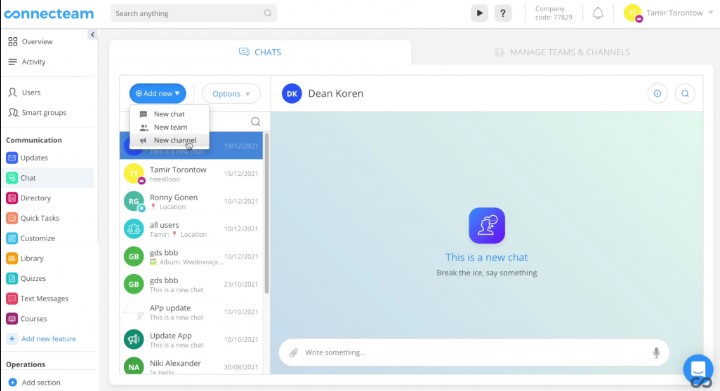
Connecteam is a beneficial solution for your business due to its ability to centralize communication, streamline workforce management, and enhance team collaboration. Whether you have an office-based team or a mobile workforce, Connecteam provides a user-friendly platform that fosters efficient communication and simplifies tasks. It offers mobile accessibility, scalability, and a range of tools to improve overall operational efficiency, making it a practical choice for businesses seeking to streamline their internal processes and enhance team productivity.
2. UpHabit

UpHabit is a beneficial tool for businesses because it simplifies contact management, streamlines relationship-building, and helps you stay organized. It provides an intuitive platform for managing and nurturing professional connections, which is essential for business growth and success. Whether you’re networking, following up with clients, or managing your contacts efficiently, UpHabit offers a user-friendly solution that can enhance your business relationships and overall productivity.
3. Slack

Slack is a valuable choice for businesses because it fosters efficient communication and collaboration among team members. It provides a central hub for real-time messaging, file sharing, and project discussions. By facilitating seamless communication, Slack helps businesses improve teamwork, boost productivity, and keep everyone on the same page. Its user-friendly interface and mobile accessibility make it an ideal tool for businesses of all sizes, enhancing internal communication and facilitating smoother workflow processes.
4. Google Docs

When asking, “What tools do I need to run a business?” Google Docs is an excellent choice. It offers a collaborative and cloud-based document creation and editing platform. It allows multiple team members to work on documents simultaneously, ensuring real-time updates and version control. This fosters seamless teamwork, simplifies document sharing, and eliminates compatibility issues. Google Docs also provides accessibility from various devices and locations, promoting flexibility and productivity within the business environment. Its user-friendly interface and integration with other Google Workspace tools make it a practical choice for businesses seeking efficient document management and collaboration solutions.
5. Hootsuite

Hootsuite is a valuable asset for businesses because it streamlines social media management. It serves as a centralized hub for scheduling and monitoring social media posts across multiple platforms, allowing businesses to maintain a consistent online presence. By providing a unified dashboard, Hootsuite simplifies social media marketing efforts, saves time, and enhances efficiency. Its user-friendly interface and analytics tools enable businesses to track their social media performance and make data-driven decisions to improve their online engagement. Overall, Hootsuite is a practical solution for businesses looking to enhance their social media marketing strategies and increase their brand visibility.
6. Join.me with GoTo

Combining Join.me with GoTo is beneficial for businesses because it enhances communication and collaboration capabilities. By integrating these two platforms, businesses can achieve a seamless and comprehensive solution for online meetings, webinars, and remote work. This collaboration simplifies the process of conducting virtual meetings and presentations, ensuring that teams can connect, share information, and collaborate effectively from anywhere. It allows for efficient communication and decision-making, which are vital components of business success, especially in today’s remote work environments. The integration of Join.me with GoTo provides a comprehensive and reliable solution for businesses seeking to optimize their online meetings and remote collaboration processes.
7. Quickbooks

QuickBooks is an excellent choice for businesses because it simplifies financial management and accounting processes. It provides a user-friendly platform for tracking income and expenses, managing invoices and payments, and generating financial reports. By streamlining these essential financial tasks, QuickBooks helps businesses maintain accurate financial records and make informed financial decisions. Its accessibility and integration with other business tools make it a practical choice for businesses of all sizes, promoting financial transparency and efficiency. Overall, QuickBooks is a valuable asset for businesses seeking to effectively manage their finances and ensure long-term financial health.
8. Hubspot
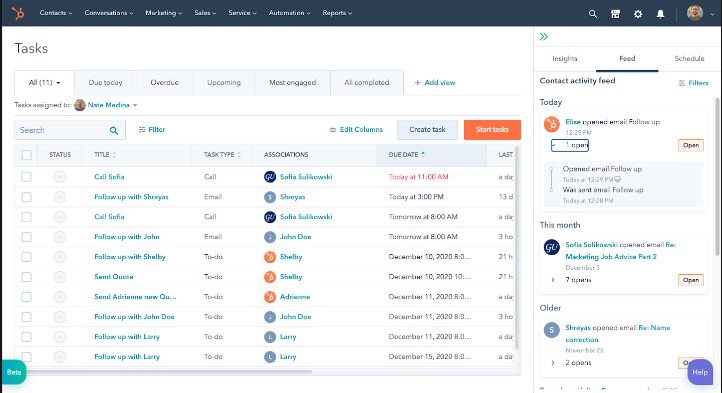
HubSpot is a valuable tool for businesses because it offers an integrated platform for marketing, sales, and customer service. By centralizing these functions, HubSpot allows businesses to streamline their customer relationship management efforts, fostering a holistic approach to customer engagement. This integrated approach enhances efficiency by providing a unified view of customer interactions and simplifying communication between marketing, sales, and support teams. It also offers scalability and flexibility, making it suitable for businesses of all sizes. Overall, HubSpot’s comprehensive platform helps businesses create a more seamless customer experience and drive growth by aligning key departments toward a common goal: satisfying customers.
9. Zoom

Another answer we can give to your question, “What tools do I need to run a business?” is Zoom. It’s a highly valuable tool for businesses because it facilitates efficient and effective communication. It provides a reliable platform for video conferencing, webinars, and virtual meetings, making it easier for teams to connect and collaborate regardless of their physical locations. Zoom enhances productivity by enabling real-time discussions, screen sharing, and document collaboration, fostering seamless communication and decision-making. Its user-friendly interface and accessibility across devices ensure that businesses can easily adapt to remote work and maintain essential connections. In essence, Zoom empowers businesses to bridge geographical gaps, optimize remote work capabilities, and maintain essential connections in today’s dynamic business landscape.
10. Proofhub
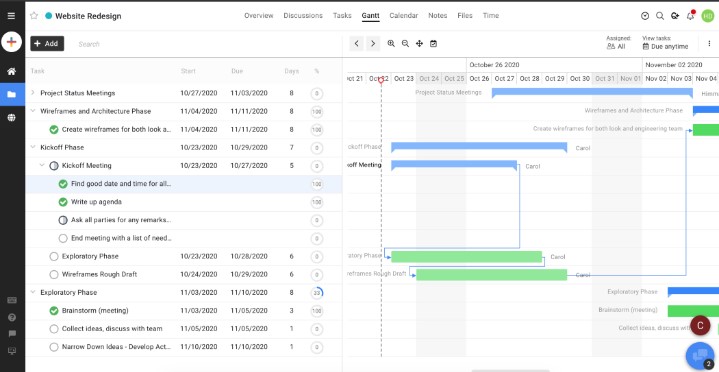
ProofHub is a valuable asset for businesses because it offers an integrated platform for project management, team collaboration, and communication. By centralizing these functions, ProofHub simplifies and streamlines the workflow, promoting efficiency and productivity. It facilitates effective team communication, document sharing, and task management, ensuring that projects progress smoothly and deadlines are met. Its user-friendly interface and mobile accessibility provide flexibility, making it suitable for businesses of all sizes. In summary, ProofHub is a comprehensive solution that empowers businesses to enhance project management, team collaboration, and overall organizational efficiency.
11. Calendly
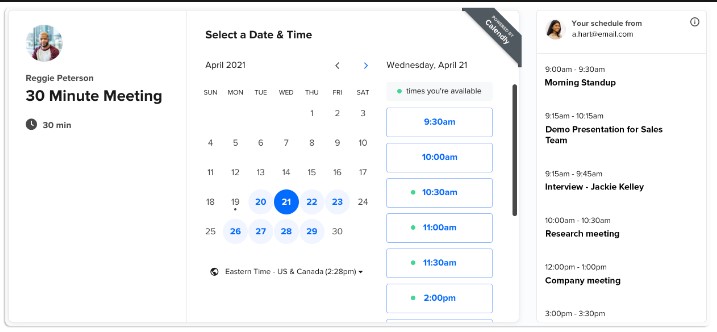
Calendly is a valuable tool for businesses because it simplifies and optimizes the scheduling process. It eliminates the back-and-forth emails and phone calls often associated with setting up meetings and appointments. By providing a user-friendly platform for individuals to book time slots that work for them, Calendly streamlines scheduling, saves time, and reduces administrative overhead. Its accessibility and integration capabilities make it a practical choice for businesses of all sizes, improving overall efficiency and enhancing customer experience. In essence, Calendly helps businesses make the most of their time by automating and simplifying the appointment-setting process.
12. Google Suite

Google Workspace (formerly known as G Suite) is highly advantageous for businesses because it offers a comprehensive suite of cloud-based productivity tools. It simplifies the management of essential business tasks and fosters seamless collaboration among team members.
By centralizing email, document creation, storage, and real-time collaboration, Google Workspace enhances overall productivity and efficiency. It allows teams to work together on projects, share documents, and communicate seamlessly, all within a secure and easily accessible platform.
The platform’s scalability and flexibility make it suitable for businesses of all sizes, whether they are startups or large enterprises. It also offers cost savings by eliminating the need for on-premises servers and reducing IT maintenance costs.
13. Trello

Trello is a powerful tool for businesses due to its intuitive and visually driven approach to project and task management. It simplifies the often complex process of organizing tasks and projects, making it easy to track progress, allocate responsibilities, and prioritize activities. With its user-friendly interface and drag-and-drop functionality, Trello ensures that teams can quickly adapt to its platform, regardless of their technical background. This versatility enhances team collaboration and productivity, as it promotes clear communication and offers a straightforward way to visualize project status and requirements.
Moreover, Trello’s adaptability and scalability make it an ideal solution for businesses of all sizes and industries. Whether you’re managing marketing campaigns, software development projects, or daily tasks, Trello can be customized to suit your specific needs. Overall, Trello empowers businesses to streamline their work processes, enhance team coordination, and efficiently manage projects, ultimately resulting in improved outcomes, increased productivity, and a more organized and effective work environment.
14. Asana
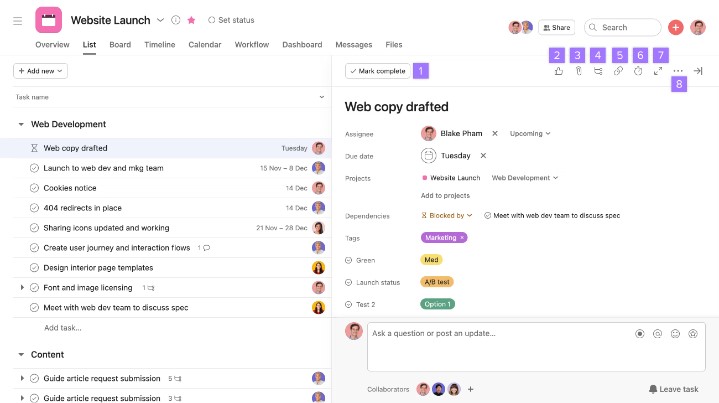
Asana is a crucial asset for businesses because it streamlines project and task management, promoting organizational clarity and efficiency. Its user-friendly interface and task-centric design simplify the planning, tracking, and execution of projects, ensuring that teams remain focused and aligned on their objectives. By centralizing project management and task assignments, Asana fosters transparent communication, enabling team members to clearly understand project status, responsibilities, and deadlines. Its adaptability and scalability also make it suitable for businesses of all sizes and industries, customizing its functionalities to meet diverse project management needs.
Furthermore, Asana’s versatile platform enhances team collaboration and productivity by providing a clear structure for work. This tool encourages effective communication and coordination, making it easy for teams to work together seamlessly. In essence, Asana empowers businesses to optimize their workflow processes, improve team alignment, and efficiently manage projects, leading to enhanced outcomes and increased productivity in a dynamic and ever-evolving business environment.
15. MailChimp
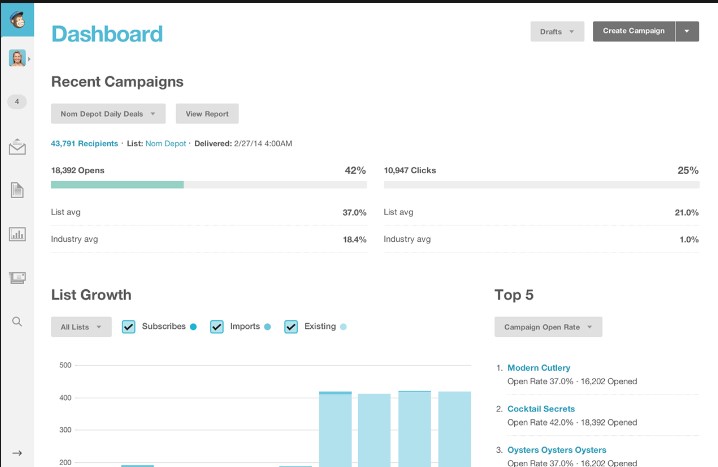
MailChimp is a valuable asset for businesses because it simplifies email marketing and communication. It offers user-friendly tools for creating and managing email campaigns, helping businesses effectively engage with their audience. Whether you’re a small startup or a large corporation, MailChimp’s scalability and adaptability make it suitable for nurturing customer relationships, driving sales, and building brand loyalty. In essence, MailChimp empowers businesses to enhance their email marketing strategies and achieve their marketing goals.
You might also like: Top 15 Easy-to-Manage Small Businesses in 2023
Conclusion: What tools do I need to run a business?
When you’re starting a business, technology, and tools are your trusty companions. You might wonder, “What tools do I need to run a business?” Well, these tools are like your business allies. They help you work smarter, make things go smoother, and make your business grow faster.
With the right technology and tools, you can make good decisions, get your team working together well, and set your business on a path to success. In today’s ever-changing world, these tools are like a map and a flashlight that guide you on your business journey. So, choose your tools wisely, and they’ll be your partners in achieving your business dreams.
You might also like: What is the Best Way to Run a Small Business in 2023?





